- Home
- Aaron Allston
Terminator 3--Terminator Dreams Page 6
Terminator 3--Terminator Dreams Read online
Page 6
“I’ve got it.”
“I’m going to tell you some things. Things we need. We want you to get them and bury them so we can find them later.”
“Who?”
“Us.”
“Who’s us?”
“Your friends. Your friends in the future.”
“Oh, okay.”
Mike saw Lake shudder. She felt like doing so herself. Either they were just talking to a little compartmented section of Daniel’s mind, a part he could never peer into when awake, or they were communicating with and manipulating a man across a chasm of more than two decades. Either way, it just felt wrong.
C.5
June, Present Day
Ávila Property
Danny was already at the breakfast table when Linda came downstairs. That was unusual in and of itself, but he also looked different.
Danny was a good-looking kid, there was no getting past it. He was as big as Alex had been, broad in the shoulder and skinny at the waist, with a face that belonged on TV—handsome, a little bland, like a TV sportscaster or a pop star who would never achieve the highest level of success. To make it worse, one black curl usually drooped onto his forehead, like Superman in the comic books.
Actually, Linda reminded herself, she shouldn’t think of Danny as a kid—she was only a couple of months older than he. But being married to his brother had put her into an increment of a generation older than he, and his manner, always energetic and humorous, just seemed youthful in this sober family.
Today, though, weariness seemed to have leeched some of Danny’s handsomeness away. There were faint dark circles under his eyes and his black hair looked tousled, unwashed. He leaned over his plate as though shielding it from an anticipated rainstorm. He had a small spiral notebook on the table beside his plate, and Linda saw he had made a lengthy list on it. Many items were lined through.
She sat at her usual place opposite him. “Well, you’re up early.”
“Been up for hours,” he admitted, and rubbed his eyes.
“Doing what?”
“Shopping.”
“Shopping?” She frowned, then realized what he must have meant. “Oh, online.”
“That’s right.”
“For what?”
“Project.”
“Well, that makes everything clear.”
“Linda, you want the usual?” That was Mama, from the kitchen.
“No, thank you, Mama. Just some eggs and toast.”
“Eggs and biscuits and gravy, that’s what we have today.”
“That’s great.” Curious, Linda tried to read the items on Danny’s list, but his handwriting, bad even when right-side up, defeated her. He flipped the notebook shut, but she couldn’t tell whether it was because she was peeking or he’d planned to anyway. His eyes, intent on what little remained of his eggs, gave nothing away.
“So how’s work?” Linda asked.
He shot her a look, and to her surprise it appeared to hold a trace of guilt. He took a moment to answer. “I’m not sure.”
“What do you mean?”
“Well, I’m doing fine. Doing great. No problems. Fixing other people’s problems, in fact.” He was speaking more quickly than usual. “But, you know I work on weapon systems.”
“Yeah, I know.” She suspected, considering stray comments he had made about programming problems, that he worked on high-end targeting systems for comparatively close-range weapons, possibly for Vulcan machine guns or antimissile defenses. She would never tell him what she’d guessed; she didn’t want him to become defensive or feel that he needed to be more secretive about his work.
“But I wonder, you know, weapons. Put ’em in the wrong hands and people get killed. Our people, I mean. Not the other people. Not the people who are supposed to get killed. Or maybe everybody gets killed, you know?”
“Uh, yeah.” Linda revised her estimate of what Danny was doing. All of a sudden, it sounded more like it related to weapons of mass destruction—maybe nuclear missiles. “But you’re going to do your job right. Nobody will get hurt because you’ve made a mistake. You’re like Alex. A perfectionist.”
“True.” Danny stared off into the distance, through house walls and across broad pastures. “If I do everything exactly, exactly right, nothing will go wrong.”
Linda felt her throat tighten. Alex had been a perfectionist, but he had been human. He’d made mistakes. One of them resulted in him being found face-down in the road, dead of a gunshot wound to the chest.
She tried to pry her attention and his from that forlorn memory. “Um, you’re starting to look like you need a day off—”
“Gotta go.” He stood, rocking his chair back; he caught it as it began to fall over. He set it back on its feet and picked up his notebook. “Going to do some old-fashioned analog shopping before I go in to work. Can I get you anything? Can of superstring?”
“Nothing I suspect you’d want to pick up for me, no.”
“Ah.” He made the word sound wise. “Adios.”
Mama came in to set a plate down in front of Linda as Danny made his hasty departure. She stared after him, shaking her head.
“Any idea what that’s all about?” Linda asked.
“I think he needs a girlfriend to calm him down,” Mama said. “All the Ávila men are like that, including Hugo. Run around like wild dogs until they’re forced to get serious about something. Danny’s the baby, but he’s already older than any of his brothers or father when they got married. So I think he’s just crazy.” She reached out to smooth a stray strand of blond hair from Linda’s eyes. “What was it they called it on TV yesterday? Testosterone poisoning.”
Linda nearly snorted up her first mouthful of eggs.
* * *
The first of the packages from Danny’s online shopping binge arrived the next morning and more arrived each day after that. Normally Mama Teresa sorted out the day’s mail on the dining room table; now, on the days Linda returned from duty before Danny, which was an increasing proportion of the workweek, Danny’s side was heaped high with brown boxes bearing labels from different shippers and various companies of origin.
Most of them were book dealers, Linda saw. Some were medical and scientific supply firms. Various departments of the U.S. government were represented. In a development that caused the first bells of alarm to begin ringing at the back of her mind, some of the boxes were from semilegitimate dealers of firearms and other weapons—dealers who also sold books and videotapes that were well-known in law enforcement circles, products that alleged to teach people how to build explosives and man-killing traps, how to survive the collapse of the U.S. government or the arrival of a totalitarian U.S. government, how to sneak about and perform assassinations with all the skill of a cinema ninja. These products were bought by survivalists and teenage boys, wannabe radicals and martial arts fans, writers and crazies, and mostly for legitimate purposes, but to a peace officer, their presence suggested that a closer look was called for.
Except Linda wasn’t an investigating officer. She was a sister-in-law.
Mama seemed to take it all a bit more philosophically than Linda. Whenever she found her daughter-in-law staring at the stacks of goods, she’d shrug and say, “Good thing he makes a lot of money.”
August 2029
Wilderness Outside the Ruins of Bakersfield, California
Mark Herrera guessed that the pastures around the Ávila property were still much as they had been decades ago—a bit more overgrown, he expected. But there were still cattle, now wild cattle, in the area to graze on them. Weeds and tough indigenous bushes were now growing among the neglected rows of the various orchards, up through the char that marked where various wooden buildings had once stood.
He stood in the middle of one of the pastures, a couple of hundred yards from the cracked, dry highway lanes that had once been 58. The half-moon overhead provided a little light, but mostly the pasture lay in deep shadow. Mark wore night-sight gear over his eyes; built recently, it was heavier, cruder, and less reliable than similar gear from the end of the twentieth century, but it was far better than wandering around night-blind.
He stood almost still for several minutes, his only motion being a slow turn of the head as he surveyed the area. Everything he saw was in shades of green, the warmer the object the brighter the green; but at this time of year, inland California baked hard throughout sunny days and released its heat back into the skies at night, so things like rock, concrete abutments, and the like could show up as bright spots. Everything he saw had to be identified and confirmed as no threat before he could bring the others up. That was the purpose of a scout.
Finally satisfied, he reached down to give his lapel mike button the shortest of double-clicks, indicating “All clear, move up.” Then he continued forward, toward the center of the property, the portion that his mother Mike had said was the one-time center of habitation.
He found it before the others reached him, a section where there were several trees and fewer grasses, where a few blackened fragments of planed wood and some metal poles embedded in the earth indicated buildings had once stood. From here, he headed east-southeast, pacing off a fairly accurate 150 yards, and found himself looking at trees, some living and some stunted in death, arranged in neat rows.
An orange grove. This was the right place.
Kyla caught up to him, moving quietly in spite of the gear she carried—a field pack with several items clipped to it, including various weapons, a folding shovel, and an apparatus with a telescoping handle and a metal disk the size of a dinner plate at one end. Also on her back was the case that held her sniper rifle. Ginger and Ripper moved just ahead of her, flanking her, looking around and occasionally glancing up at her face to gauge her demeanor.
Kyla was silent. The Hell-Hounds didn’t like to make noise when exposed in the open like this. Mark nodded to her. She unclipped the apparatus, extended the handle, jacked the cable for a pair of headphones into the handle, and donned the headphones. She moved off at an angle, holding the disk of the apparatus an inch or so off the ground as she went. The dogs went with her, Ripper’s tail wagging just a little as they explored this new territory.
Mark waited where he was, his assault rifle at the ready, and watched as Earl made his way to Mark’s position. Ten, the fourth member of the Hell-Hounds’ current roster, and the unit leader, was still recuperating from the beating he’d taken at the hands of the T-800 days ago.
Kyla walked more or less due north for less than ten yards. Then she stopped, waved her metal detector around a bit, and turned sharply to the right, back toward the orange grove. Mark knew she had to have reached the buried irrigation pipes and cables for temperature and humidity sensors that Mike had told them about, and this was another milestone on their mission.
This crazy mission. Mike hadn’t told them much about it, except that it involved Daniel Ávila having buried a time capsule of useful scientific facts back when he was a kid and suddenly remembering it a few nights ago. But even John Connor had agreed that it was worth finding, so here they were.
“Something flying,” Earl said.
Mark glanced at him and then up in the direction Earl was looking. There it was, bright red dot, miles to the northwest, moving west to east.
Mark gave the “get under cover” whistle and immediately trotted to the nearest tree, putting it between him and the distant bogey. Earl was right behind him, already spreading out an insulating blanket. He draped it around the both of them.
Adapted from thin, highly reflective plastic materials developed decades ago, this blanket was silvery on one side but covered with black cloth on the other. Its insulating properties retarded the passage of heat very successfully; already warm from running around with full gear in the summer night air, Mark felt himself begin perspiring heavily within moments of the blanket settling around him.
The blanket couldn’t keep all the heat in, of course. It would flow out under the edges, out through overlaps, through small holes. But the important thing was that it wouldn’t look like a human being’s heat-trace. Skynet hadn’t begun a program of extermination of every living thing on earth, just the humans. Whatever the flying object was, if it had an infrared sensor trained on them, it would see irregular patches of heat that did not match human profiles.
Probably.
Earl, whose time sense was better than Mark’s, poked his head out. “All gone,” he whispered. “Back to it.” He threw off the blanket.
Two minutes later, Kyla whistled for them. She stood on a spot of grassy earth yards outside the orange grove, the metal detector already folded up and restored on her pack; her pack was on the ground and she was now unfolding her camp shovel. Mark and Earl joined her and they began to dig. The dogs, happy that the humans were doing something new, trotted around, tails high and wagging.
Two feet down, Earl’s shovel was the first one to hit something that was not soil. It made a hollow, gonglike noise against a hard surface. In moments, the others had made similar discoveries.
They cleared earth away from four circular metal surfaces. Lying across two of them was a mass of cloth that, with its length and width, could have been wrapped around a skeletal human body.
“Looks like he buried it in fifty-five-gallon oil drums,” Earl said. He pulled his night-sight gear up from his eyes and flicked on a penlight. “Painted blue. You want to bet that’s good rust-resistant paint?”
“No bet,” Kyla said. She hauled the cloth-wrapped mass up out of the hole, set it aside, and began unwrapping it.
“Hey, that might be booby-trapped,” Mark said.
She gave him a withering look. “Daniel Ávila buries a time capsule for future generations to admire and then puts a booby-trap on top? ‘Here’s your present, boom’?”
“Never mind.”
She finished unwrapping it. It was a hand truck. “He even made sure the people of the future would be able to move his stuff,” she said. There was a trace of suspicion to her voice.
“Open it or move it?” Earl asked.
Mark shook his head. “Move it all back to the transport, then dig into it. We don’t want to be caught by a Hunter-Killer patrol hundreds of yards from our vehicle while we’re digging through twentieth-century pornographic magazines and comic books.”
August 2029
Hornet Compound
John Connor sat in a patio chair in the sentry station the people of Hornet Compound called High Spy.
The patio chair, like practically every pre–Judgment Day object still in continuous use, had been extensively refurbished and carefully maintained. The original aluminum frame was in good condition, scratched and scored but not bent. The nylon webbing that had once supported a sitter’s weight was all gone, replaced by leather straps. John supposed that the combination of pre-apocalyptic aluminum and deer hide looked a bit odd, barbaric, but he was so used to that type of juxtaposition of materials that it scarcely registered with him anymore.
The High Spy was actually the original entry into the mine—the portion of the mine claimed and worked in the middle of the nineteenth century. It was a third of the way up this dual-peaked, half-mile-high mountain. The entrance now had dark blankets stretched across it, leaving gaps through which the sentry stationed here could observe the mountain slope and valley below. Directly over John’s head, a hole had been drilled in the stone and loaded with explosives; there was a manual detonator within reach of the chair, and an insulated copper wire led back into the mine, allowing the compound’s security team to blow the charge remotely if need should arise. One flip of a switch at either place, and the High Spy sentry station would cease to be a possible entry for Skynet forces.
The presence of so much explosive power so close didn’t faze John. He’d lived next to too many similar security measures for too many years to be perturbed.
A century and a half ago, the hard-rock gold mine had been worked with picks and muscle, dynamite and instinct. This entryway was a natural tunnel into a cave, but at the back of the cave the mine workings began, crude tunnels that needed no wooden ceiling supports because they were chipped out of solid stone.
Much of the mine consisted of tunnels that meandered in a southeast to northwest direction, following the natural flow of the gold-bearing quartz veins. Then there were shorter cross-tunnels connecting the longer ones, and a vertical hole, labeled Shaft 1, that led deeper into the mountain and the tunnels below.
Ahead of John, about a thousand feet down the mountain slope, was the main entrance into the mine as it had been worked in the 1960s. Then, speculators had found new veins of quartz, brought in new digging equipment, set up new processing facilities. They had dug the mine down to depths of a thousand feet below the base of the mountain.
From here, John could see the ruins of the later mine works. Hornet Compound’s leader, Lucas Kaczmarek, had pointed out the various buildings to John earlier in the day.
John could barely make out the mill, the building where the quartz ore had been ground down to a consistency like talcum powder, and the vat facility, where the ground ore had been poured into enormous vats and treated with cyanide to extract the gold. It was easier to see the several dump sites where hundreds and thousands of tons of tailings, the quartz dust from which the gold had been extracted, had been left. They gleamed brightly in the moonlight, tiny, lifeless deserts both near and in the distance.
John tried to imagine what the place would have looked and sounded like when operational—giant dump trucks hauling ore between the main entrance and the mill, air blowers roaring, the mill grinding. It wouldn’t have been pretty, but it would at least have been an industry of mankind, ugly but comforting.
The intercom on the floor beside the chair beeped. Like most of the intercoms in Hornet Compound, it had been reconditioned from an old push-button phone. John picked up the receiver. “Connor.”
“Commander, this is Lucas. We’re getting packet radio transmissions from the Hell-Hounds.”
John took a deep breath. A month ago, the Human Resistance’s last communications satellite had been destroyed by Skynet. Since then, radio transmissions between resistance groups had been a more dangerous affair, and teams in the field knew to transmit encoded data packets rather than voice whenever possible, and to leave the area as soon as they could after ceasing transmissions. Radio transmissions were a necessary part of Resistance activities, but they were also a beacon for Skynet’s forces. “I’ll be right down,” he said.

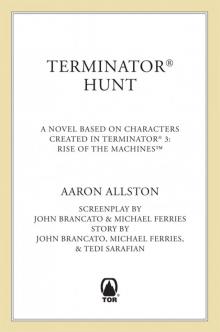 Terminator 3--Terminator Hunt
Terminator 3--Terminator Hunt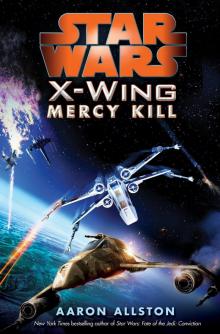 Mercy Kil
Mercy Kil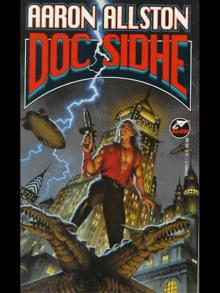 Doc Sidhe
Doc Sidhe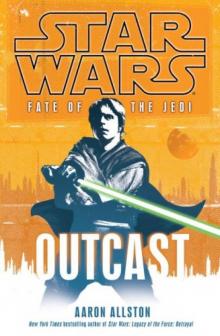 Star Wars: Fate of the Jedi: Outcast
Star Wars: Fate of the Jedi: Outcast Fate of the Jedi: Backlash
Fate of the Jedi: Backlash Mercy Kill
Mercy Kill Rebel Stand
Rebel Stand Wraith Squadron
Wraith Squadron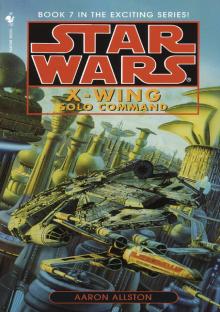 Star Wars: X-Wing VII: Solo Command
Star Wars: X-Wing VII: Solo Command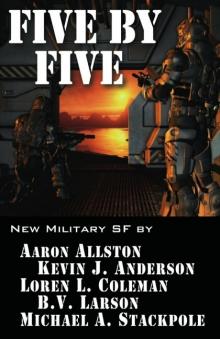 Five by Five
Five by Five Solo Command
Solo Command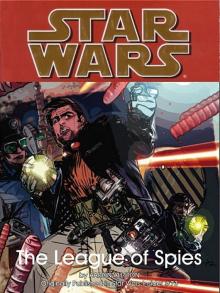 Star Wars: The Clone Wars Short Stories: The League of Spies
Star Wars: The Clone Wars Short Stories: The League of Spies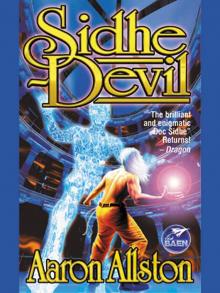 Sidhe-Devil
Sidhe-Devil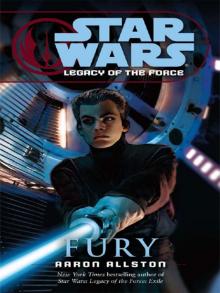 Star Wars: Legacy of the Force: Fury
Star Wars: Legacy of the Force: Fury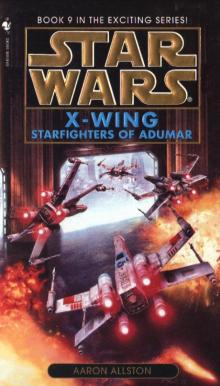 Starfighters of Adumar
Starfighters of Adumar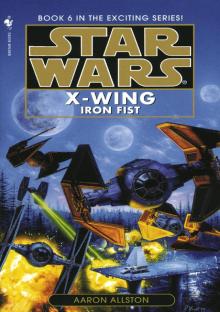 Star Wars: X-Wing VI: Iron Fist
Star Wars: X-Wing VI: Iron Fist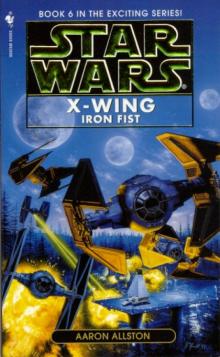 Star Wars - X-Wing - Iron Fist
Star Wars - X-Wing - Iron Fist Exile
Exile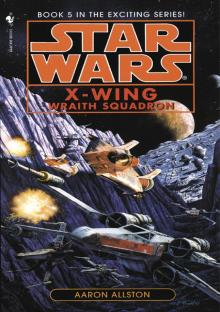 Star Wars: X-Wing V: Wraith Squadron
Star Wars: X-Wing V: Wraith Squadron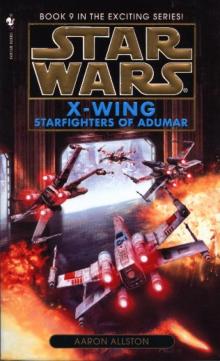 Star Wars - X-Wing - Starfighters of Adumar
Star Wars - X-Wing - Starfighters of Adumar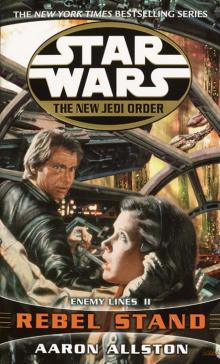 Rebel Stand: Enemy Lines II
Rebel Stand: Enemy Lines II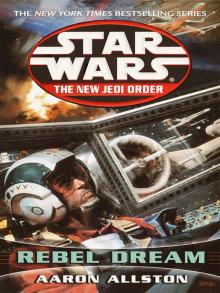 Rebel Dream: Enemy Lines I
Rebel Dream: Enemy Lines I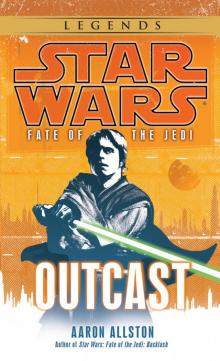 Outcast
Outcast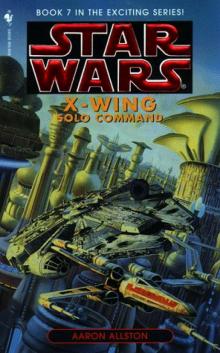 Star Wars - X-Wing 07 - Solo Command
Star Wars - X-Wing 07 - Solo Command